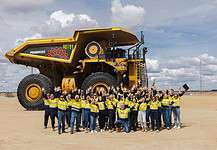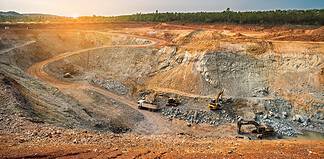MINING’S most effective excavation tool in the future could be cutting-edge mathematics, which the industry is adopting to dig away at its emissions and carbon footprint.
With the COP26 United Nations Climate Change Conference concluding in Glasgow today, an “Industrial Revolution 2.0” looms as businesses worldwide change the way they operate to meet green targets.
The Australian Government has committed to net-zero carbon emissions by 2050, putting pressure on local businesses – particularly in the mining and resource sector – to adopt more sustainable operations.
Already, industry leaders like BHP, OzMinerals and Fortescue have begun changes to turn their operations to zero-carbon.
Brisbane-based industrial mathematics company Polymathian is leading the revolution, with their technical expertise paving the way for the mining industry to identify operational efficiencies while simultaneously reducing their carbon footprint.
Polymathian’s Simulation capabilities and “digital-twin” technology allows companies to reduce costs and their carbon emissions by introducing scenarios which can be live tested in the digital world.
While climate and carbon targets have been set at 2050, Polymathian Head of Simulation Colin Eustace says the tools already exist for companies looking to transition to greener operations – even in mining.
“The future is now. All the building blocks that businesses need to make improvements and change technology are there,” Mr Eustace said.
“The drive to reduce greenhouse gases can be a trigger to change the way mining operations work and there are significant operational efficiencies to be gained by optimisation and changing some of the fundamentals about the operation.
“Some of those changes can be identified by leveraging existing technology.”
Mr Eustace said Polymathian’s software is driving a win-win scenario for business on both the environmental front and in bottom-line efficiency.
Polymathian uses “digital twin” technology to provide a digital replica of a customer’s existing operations, allowing companies to assess, for instance, the first scope of the Green House Gas (GHG) Protocol.
The digital twin technology provides a better understanding of base-line performance and assesses the impact of changes made to the business through capital or operational expenditure – such as replacing diesel-powered machinery with electric vehicles.
The technology can also test any operational strategy and its impacts on emissions and make future forecasts of the impact on the business.
Mr Eustace said once a model is established, solutions to complex problems which would previously take a team of experts weeks to generate could now be solved in minutes.
These efficiencies enable businesses to make smarter economic decisions and assess the best strategy to begin transitioning towards a net-zero future.
“An example of that in underground mining operations is replacing diesel loaders with electric loaders … and testing whether we can get a performance increase out of the system,” Mr Eustace said.
“Mine designs are a complex interplay of capital infrastructure and operating costs. A significant operating and capital cost for underground mines is the ventilation.
“Most of the ventilation requirement comes from the need to exhaust diesel particulates and the emissions of diesel vehicles underground.
“If you change those diesel vehicles to electric vehicles and reduce that ventilation load significantly, it changes the interplay between the vehicle operating costs and infrastructure.
“That can significantly improve the performance of the operations at the same time.
“We work with our clients to determine how improvements can be implemented while using industrial mathematics and simulation to quantify the potential improvements as things change in the future.”
Polymathian is a technology partner of Amazon-owned AWS. Amazon has a global agenda to be carbon neutral by 2040, and shares Polymathian’s commitment to helping global businesses achieve that goal.
“AWS is an important business partner for Polymathian because they provide the cloud infrastructure to enable us to deploy our solutions to our customers,” Mr Eustace said.
“Having shared goals with AWS is an important factor in being able to reduce carbon emissions by enabling the infrastructure and the applications necessary to support businesses.”







































